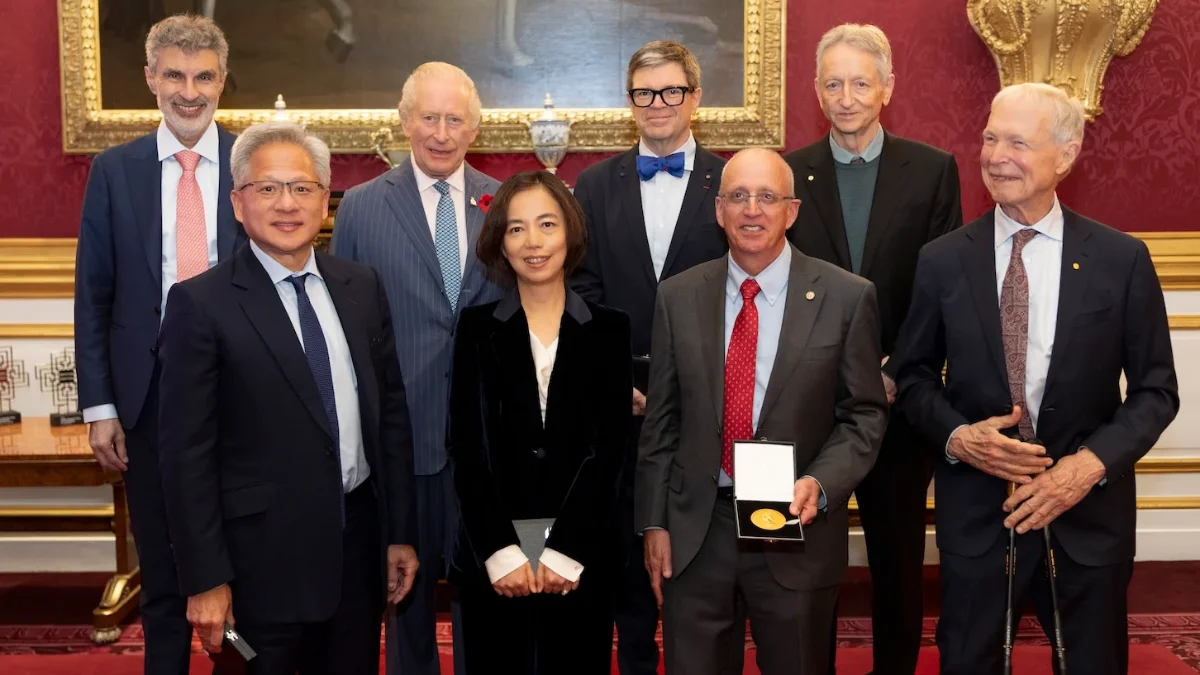Necessary Always Active
Necessary cookies are required to enable the basic features of this site, such as providing secure log-in or adjusting your consent preferences. These cookies do not store any personally identifiable data.
|
||||||
|
||||||
|
||||||
|

In Focus
In a historic acknowledgment of pioneering work in artificial intelligence, Nvidia CEO Jensen Huang honoured alongside other leading AI figures at the 2025 Queen Elizabeth Prize for Engineering.
The ceremony, held at St James’s Palace in London, was covered by UKTech.News and included a roundtable at 10 Downing Street with the UK Technology Secretary. The award recognises contributions that have not only advanced machine learning research but also enabled large-scale deployment of AI systems across industry and enterprise, demonstrating the practical impact of engineering breakthroughs.
The 2025 Queen Elizabeth Prize spotlighted engineers and researchers who have shaped the AI landscape over the past decades. Alongside Jensen Huang Queen Elizabeth Prize recognition, laureates included Geoffrey Hinton, Yann LeCun, Yoshua Bengio, Fei-Fei Li, John Hopfield, and Bill Dally. Their collective work encompasses algorithmic innovation, neural network development, and computational infrastructure that underpins today’s AI applications.
“Our 2024 and 2025 Laureates represent the very best of engineering. Together, their work demonstrates how engineering can both sustain our planet and transform the way we live and learn,” said Science Minister Lord Vallance, chair of the Queen Elizabeth Prize for Engineering Foundation, as reported by UKTech.News.
Related Post – UK Government Launches £1 Million Regional Tech Programme to Strengthen Regional Innovation
The ceremony reinforced the strategic importance of AI in global technology ecosystems:
Jensen Huang stated, “I am deeply honoured to receive the Queen Elizabeth Prize for Engineering and to be recognised among the pioneers whose work has shaped the world we live in today. This prize has honoured the visionaries who gave us the internet, GPS, digital imaging, and wireless technology—breakthroughs that have transformed industries and everyday life,” as stated in UKTech.News.
Recognition of these AI and ML leaders highlights the increasing relevance of advanced computing in business decision-making. Organizations can now leverage high-performance AI infrastructure for predictive analytics, automation, and data-driven strategy implementation.
Huang’s work with Nvidia exemplifies the integration of hardware and software systems, demonstrating how engineering innovation directly enables commercial and industrial applications. On November 3, 2025, the British government partnered with G7 countries and Australia to fast-track quantum technologies development.
The award also underscores the growing collaboration between government, academia, and industry. By convening global AI experts, the UK is positioning itself as a hub for AI engineering leadership, encouraging international partnerships and talent development.
The recognition of Huang and his peers by the Queen Elizabeth Prize establishes a benchmark for excellence in AI engineering. Their work exemplifies the integration of algorithmic research, large-scale hardware, and applied machine learning systems, which are critical for enterprise deployment. In other news, Google has decided to make a $6.8 billion (£5 billion) investment in the U.K.
As AI continues to shape industries worldwide, such awards highlight the tangible outcomes of engineering innovation, providing insights into where investment in AI infrastructure, talent, and partnerships can yield meaningful impact.